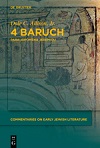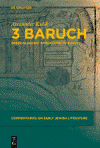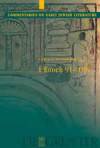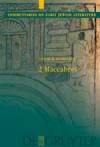| Buchhandlung Heesen | Versandbuchhandlung für Evangelische Theologie |
Impressum | |
| Freudenstadt / Loßburg | Datenschutzhinweise | ||
| Tel. 07446 952 418 1 | Buchhandlung.Heesen@t-online.de | ||
| Da unsere Angebote manuell erstellt werden und während des Seitenaufrufes keine Verbindung zu einer Buchdatenbank aufgebaut wird prüfen wir die Verkaufspreise bei Rechnungsstellung auf Richtigkeit und berechnen den gesetzlich festgelegten Buchpreis. Falls sich dadurch eine Preiserhöhung ergibt werden wir Sie vor Versand informieren, Sie können dann diesem Preis zustimmen oder vom Kauf zurücktreten. Hinweise zum Datenschutz und Cookies | |||
| Commentaries on Early Jewish Literature (CEJL), de Gruyter | ||||||
| Die auf ca. 58 Bände
angelegte englischsprachige Reihe behandelt die frühe
jüdische Literatur zwischen dem 3. Jahrhundert v. Chr.
und der Mitte des 2. Jahrhunderts n. Chr. Die Schriften
sollen jeweils als textliche Einheit vor dem Hintergrund
ihres jeweiligen jüdischen und historisch-politischen
Kontextes ausgelegt werden. Dabei werden textbezogene,
historische, literarische und theologische Analysen
erstellt. The publishing house Walter de Gruyter is pleased to announce the inauguration of a commentary series which is the first to focus on early Jewish literature. The chief aim of this project is the production of text-based, historical, literary, and theological analyses of Jewish writings whose composition or basic ideas can be traced to the period between the 3rd century BCE (the aftermath of Alexander the Great's conquests) and the mid-2nd century CE (the time of the Bar Cochba revolt and during the codification of the Mishnah). The approximately 58 CEJL volumes shall attempt to uphold the integrity of each writing in relation to its formative Jewish (and religious-historical) context. Each of the volumes will address the following problems: manuscript evidence, formative religious and tradition-historical developments, and social context. Where appropriate, the CEJL volumes shall provide a framework through which to examine the transmission history of the writings. The creation of the CEJL series comes at a time when Jews and Christians are exploring common and distinguishing dimensions of their respective religious traditions. While much attention has been given in recent years to the 'parting of the ways' between Jews and Christians on the basis of writings in the New Testament, CEJL will mark an important achievement in laying groundwork for a further exploration of the interrelatedness between the two now distinct religions. |
||||||
| Autor | Titel | EUR | Jahr | |||
| 978-3-11-026973-4 | Dale C. Allison, Jr | 4 Baruch. Paraleipomena Jeremiou |
89,95 |
|
2018 | |
| 978-3-11-021248-8 | Alexander Kulik | 3 Baruch. Greek-Slavonic Apocalypse of Baruch / discription | 199,95 | 2010 | ||
| 978-3-11-020503-9 | Pieter W. van der Horst | Early Jewish Prayers in Greek | 84,-- |
|
2008 | |
| 5 | 978-3-11-019119-6 | Loren T. Stuckenbruck | 1 Enoch 91-108 / discription | 280,00 |
|
8/2007 |
| 4 | 978-3-11-019118-9 | Daniel R. Schwartz | 2 Maccabees / discription | 280,00 |
|
2007 |
| 3 | 3-11-018241-6 | Walter T. Wilson | The Sentences of Pseudo-Phocylides | 74,-- |
|
2005 |
| 2 | 3-11-017888-5 | Dale C. Allison Jr. | Testament of Abraham | 98,-- |
|
2003 |
| 1 | 3-11-017574-6 978-3-11-017574-5 |
Joseph A. Fitzmeyer | Tobit | 199,95 |
|
2003 |
 |
Dale C. Allison 4 Baruch Paraleipomena Jeremiou De Gruyter, 2018, 463 Seiten, Leinen, 978-3-11-026973-4 89,95 EUR |
This is the first full-scale, verse-by-verse
commentary on 4 Baruch. The pseudepigraphon, written in the second
century, is in large measure an attempt to address the situation
following the destruction of the temple in 70 CE by recounting legends
about the first destruction of the temple, the Babylonian captivity, and
the return from exile. 4 Bruch is notable for its tale about Jeremiah's
companion, Abimelech, who sleeps through the entire exilic period. This
tale lies behind the famous Christian legend of the Seven Sleepers of
Ephesus and is part of the genealogy of Washington Irving's ""Rip Van
Winkle."" Allison's commentary draws upon an exceptionally broad range
of ancient sources in an attempt to clarify 4 Baruch's original setting,
compositional history, and meaning. more Literature to 4 Baruch |
 |
Alexander Kulik 3 Baruch Greek-Slavonic Apocalypse of Baruch de Gruyter, 2010, 320 Seiten, Leinen, 978-3-11-021248-8 199,95 EUR |
This work provides the key
to one of the most enigmatic Jewish Hellenistic texts preserved in Greek
and Slavonic. Despite the fact that 3 Baruch is one of the major early
Jewish apocalypses, it has been relatively neglected in modern
scholarship, probably since 3 Baruch is one of the most difficult works
to comprehend and classify. Its content differs significantly from that
of other writings of the same genre, as the book preserves syncretistic
ideas and tendencies which are combined in unique ways. The worldview,
the message, and the very textual structure of 3 Baruch are enigmatic in
many respects. The present study demonstrates that the textual history
of 3 Baruch, implicit meanings and structural links in its text, as well
as conceptions behind the text, are partly reconstructable. Moreover, 3
Baruch, properly read, significantly enriches our understanding of the
history of the motifs found in early Jewish lore, at times providing
missing links between different stages of their development, and
preserves important evidence on the roots of Jewish mysticism,
proto-Gnostic and proto-Christian traditions. The study contains the
introduction, synoptic translation, textual notes, and detailed
commentaries. more Literature to 3 Baruch |
 |
Loren T.
Stuckenbruck 1 Enoch 91-108 de Gruyter, 2007, 656 Seiten, 978-3-11-019119-6 280,00 EUR |
The volume is a commentary
on 1 Enoch chapters 91-108 that begins with the Ethiopic text tradition
but also takes the Greek and Aramaic (Dead Sea Scrolls) evidence into
account. This section of 1 Enoch, which contains material from at least
five different documents composed some time during the 2nd century BCE,
provides a window into the early stages of the reception of the earliest
Enoch tradition, as it was being negotiated in relation to elitist
religious opponents, on the one hand, and in relation to other Jewish
traditions that were flourishing at the time. The commentary, at the beginning of which there is an extensive introduction, is structured in the following way: there is a translation for each unit of text (including the Greek and Aramaic where it exists, with the Greek and Ethiopic translations presented synoptically), followed by detailed textual notes that justify the translation and provide information on a full range of variations among the manuscripts. This, in turn, is followed by a General Comment on the unit of text; after this there are detailed notes on each subdivision of the text which attempt to situate the content within the stream of biblical interpretation and developing Jewish traditions of the Second Temple period. The five documents in 1 Enoch 91-108 are dealt with in the following order: (1) Apocalypse of Weeks (93:1-10; 91:11-17); (2) Admonition (91:1-10, 18-19); (3) Epistle of Enoch (92:1-5; 93:11-105:2; (4) Birth of Noah (106-107); and (5) the Eschatological Appendix (108). more Literature to 1 Enoch |
 |
Daniel R.
Schwartz 2 Maccabees de Gruyter, 2007, 400 Seiten, Cloth, 978-3-11-019118-9 280,00 EUR |
2 Maccabees is a Jewish work
composed during the 2nd century BCE and preserved by the Church. Written
in Hellenistic Greek and told from a Jewish-Hellenistic perspective, 2
Maccabees narrates and interprets the ups and downs of events that took
place in Jerusalem prior to and during the Maccabean revolt:
institutionalized Hellenization and the foundation of Jerusalem as a
polis; the persecution of Jews by Antiochus Epiphanes, accompanied by
famous martyrdoms; and the rebellion against Seleucid rule by Judas
Maccabaeus. 2 Maccabees is an important source both for the events it
describes and for the values and interests of the Judaism of the
Hellenistic diaspora that it reflects - which are often quite different
from those represented by its competitor, 1 Maccabees. more Literature to 2 Maccabees |